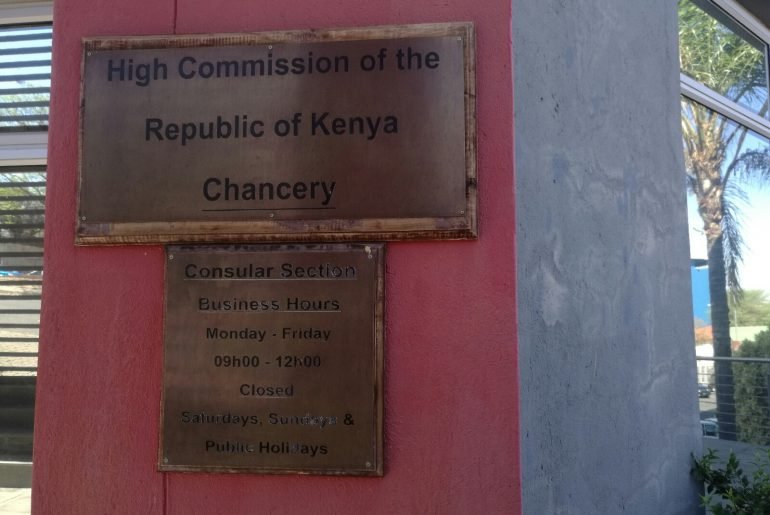What is a High Commission? What is an Embassy? What is the difference between a High Commission and an Embassy? What is the role of a diplomatic mission? Is the role of embassies and high commissions only to issue visas ? Is the role of high commissions and Embassies to throw parties for dignitaries? Who is entitled to visit a High Commission or Embassy? Why does Kenya invest money in having diplomatic missions abroad? Are they worth having?
While on a recent visit to Namibia, these and more questions tickled my mind. I have only visited diplomatic missions and in this case -foreign embassies, four times in my life, to apply for a tourist visa. In some of these cases, the reception was neither warm nor friendly, I honestly felt unwelcome. At best, it was one of the most nerve wracking experiences ever, with emotions moving from anxiety to anger in others. I thus wondered, is this what people also face at Kenyan diplomatic missions? I thus decided that I would find out first hand about them, their role, why exactly they exist and how they treat common folk. My first worry however was, “How do I get permission to visit the Kenyan diplomatic mission in Namibia?

First up, I Googled, “Embassy of Kenya in Namibia” and kept being redirected to the Kenya High Commission in Namibia. I wondered, “does Embassy and High Commission mean the same thing?” Oh well, I would ask them if I got a chance to talk to them. Next up, I got their contact number Tel: +26461226836 and called. The lady on on the other side of the call was very polite and warm-I liked her. I then went on to inform her of my purpose for calling. The conversation went something like this, “Hi, my name is Wangechi Gitahi, A Kenyan visiting Nambia for a few days and I wanted to find out about the Kenyan Embassy and what it does. Kindly, can you direct me to anyone who may be of assistance and perhaps even enable me to meet the ambassador?’ (The Naivity and lack of knowledge). I am almost 100% sure she was surprised by the call, but she took it in stride. She transferred me to a gentleman named Ben, who granted me an appointment for the next morning. I think he was also curious about my request.
That my dear people is how I found myself at the Kenya diplomatic mission, in Namibia. It is located along Robert Mugabe Avenue, and the building is known as Kenya House. The first thing I noted is that it is branded “Kenya High Commission” and not “Embassy of Kenya”, as I had errorneous continued to call it. At the entrance, you have to register with the security so have your identification document with you-I had my passport. Once done with security, I was directed to the main building that houses the High Commission. I was received by front office team, who then proceeded to usher me to meet Mr. Ben Kidew at his office.

Mr. Ben Kidew is an Administrative Attache at the Kenya High Commission, Namibia. He then guided me to the visitors lounge where after pleasantries and introductions, he graciously educated me on all things diplomatic missions, as we sipped a cup of tea. Below are some of my learnings:
1: I got to solve the mystery on the difference between a High Commission and an Embassy. Embassies are diplomatic missions sent to Non-Commonwealth countries, while High Commissions are diplomatic missions sent to Commonwealth countries. The head of an Embassy is called an Ambassador while the head of a High Commission is called a High Commissioner.
2: Diplomatic missions are represented by an Embassy, High Commission or Consulate.
3: The first role of a diplomatic mission is to represent and take care of its citizens in the respective country. This surprised me, as I always thought that the main role of a diplomatic mission or what we refer loosely to as “Embassies”, is to represent its government. They are involved in the below roles as regards their citizens:
a) It helps its citizens in emergency cases or if one has a problem. If for example your loved one travels to Namibia, and you can no longer reach them, the first place you should start is to report it to the diplomatic mission. They would then advise and guide on the next steps of action to take, including them filing a missing person report.
b) To monitor cases of lawlessness their citizens may be engaged in. In cases where a Kenyan citizen is arrested, the Embassy should be informed by the friends and /or family, though the host country in most instances will also inform them. The embassy is able to intervene in some cases, by contacting the family and friends, to also overseeing that the rule of law is applied.
c) It renews passports and other travel documents for its citizens living in the diaspora. In cases where one loses their Identification document like Passport, they could also facilitate one getting a travel document that would enable them to return home, if perhaps they were in the foreign country for a short duration.
d) To report the status of its citizens to its government back home. This applies on issues like birth, deaths, marriages, divorces,detained among others.
e) To offer information to its citizens about the foreign country. This includes issues like security, tourism, health, education, business opportunities among others.
f) They facilitate the citizens feeling at “home” away from home via sharing contacts, networks and hosting Kenyan National Holiday festivities. These enable the citizens to meet, connect, network and join the “Kenyan community” while in Namibia.
4) To represent the Government of Kenya
It plays this role in various ways:
a) It is a one stop shop on all things about Kenya. It has the following diplomacy departments: Tourism, Economic, Diaspora, Education, Health sector among others departments.
b) They play “host” to foreign dignitaries and even Kenyan Government officials that visit Namibia.
c) They host official functions/ national events like Jamhuri day etc
d) They offer visas to foreigners who need a visa to travel to Kenya
e) They provide the Government of Kenya with information on various issues from security to business opportunities available

4: The outgoing High Commissioner to Namibia is High Commissioner Isaac Njenga, while the incoming is High Commissioner Benjamin Langat.
5: It is recommended though not compulsory, to register with ones diplomatic mission abroad. You should inform them of your Name, share a copy of your passport, share details of where you are from and where you are travelling to, purpose of your visit, contact while in the country to cases you may be having or facing. You can contact them via a visit to the High Commission, call and/ or email them on windhoek@mfa.go.ke for assistance. As noted above, it is for your best interest for the diplomatic mission to know of your presence in the foreign country.
I highly highly appreciate Mr. Kidew for taking time to unravel the mystery that has been “The role of diplomatic missions in a foreign country”. I was truly surprised to learn that its first role is to represent and take care of “its citizens” and not, its government. I thus urge each one of you to always register with the Kenyan “Embassy” or “High Commission” or “Consulate” in whichever country you are travelling. It is there to serve you thus, let them serve you. They also have insights on the country you are visiting and will thus offer insight that may ease your experience. It is also a “safety net” to have your government at your service, while abroad. Thank You to everyone at the Kenya High Commission, Namibia, for not only being great hosts, but being warm and friendly to a common citizen. I will definitely visit when I return and hopefully get to meet the High Commissioner. From now henceforth, I will definitely be registering and visiting the Kenyan diplomatic missions abroad. I will let you know if they are all as warm and welcoming 🙂




1 Comment
Good article and right to the point. I don’t know if this is really the best place to ask but do you folks have any thoughts on where to employ some professional writers? Thanks in advance 🙂